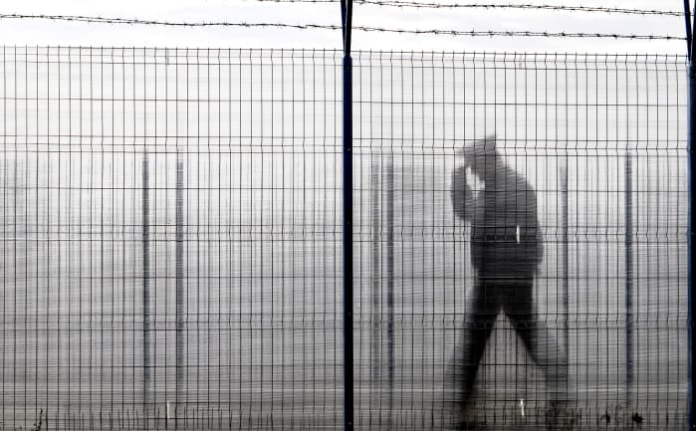FILE – A Romanian border police officer, seen through a plexiglass fence, patrols a railway border crossing point between Romania and Moldova in Ungheni, Romania, on Jan. 18, 2011. European Union countries will weigh on Thursday, Dec. 8, 2022, whether the bloc’s three newest members Bulgaria, Romania, and Croatia can fully open their borders and participate in Europe’s ID check-free travel zone, but more delays to their entry appear likely. (AP Photo/Vadim Ghirda, File)
BRUSSELS – European Union countries are weighing on Thursday whether the bloc’s three newest members — Bulgaria, Romania, and Croatia — can fully open their borders and participate in Europe’s ID-check-free travel zone, but more delays to their entry appear likely.
A green light would be a boon for their economies. The so-called Schengen area is the world’s largest free travel zone. It comprises 26 countries — 22 EU states plus Iceland, Liechtenstein, Norway and Switzerland. Almost 1.7 million people live in one Schengen country and work in another. Around 3.5 million people cross an internal border each day.
But full accession for the EU’s newest members — Bulgaria and Romania joined the bloc in 2007, Croatia in 2013 — requires unanimous support from their partners, and objections were still being raised on the eve of a meeting of interior ministers in Brussels meant to examine their cases.
The three countries already partly adhere to the Schengen rulebook, but internal border controls have yet to be lifted. The hold-up has long been over concerns among the trio’s partners about the reach of organized crime, unauthorized migration, and other security concerns.
Last month, the EU’s executive branch, the European Commission, ruled that all three candidate countries meet the technical criteria for joining, and the European Parliament has also voted in favor of their membership.
But a positive outcome for all three nations is uncertain. Austria appears almost certain to veto the Bulgarian and Romanian bids over immigration, as increasing numbers of people cross its borders without authorization via the Balkans region.
Croatia’s bid, however, has not received any notable opposition from its EU partners.
Austrian officials are anxious that abolishing internal border checks could make Bulgaria and Romania thoroughfares for asylum-seekers. Right-wing parliamentarians from the Sweden Democrats party have opposed membership for the three hopeful countries, citing similar worries.
Romanian Prime Minister Nicolae Ciuca said Wednesday that his government has had “meetings at the highest levels” with Austria to try to ease the concerns, and noted that data shows “Romania is not on migration flows that would generate fears.”
“Illegal migration is politically very sensitive in many member states … but blocking Romania’s accession to Schengen will not bring the answers Austria wants,” he said in a news conference, adding that “the current state of uncertainty cannot continue.”
Dutch Prime Minister Mark Rutte also sparked a furor last week when he alleged that Bulgarian border security officials could accept cash bribes. The Dutch parliament must also weigh in, meaning that Bulgaria might be more likely to join later than the two other candidates.
Bulgarian President Rumen Radev hit back, writing on Facebook that three Bulgarian border officials have been killed in recent months while protecting the bloc’s external borders. “Instead of European solidarity,” Radev said, “Bulgaria receives cynicism.”
In an effort to ease their partners’ concerns, Bulgaria and Romania invited EU fact-finding missions with national experts twice in recent months to see how things have improved.
Hungary appears ready to delay their entry, too, as it has done with several EU issues that require unanimity voting in recent months, mostly due to the right-wing government’s objections that its access to European pandemic recovery funds is being held up over corruption concerns.
The Schengen rulebook allows free movement to more than 400 million European citizens and businesses but nations can introduce temporary checks on grounds of internal threats to national security, and several routinely do so.
Observers have pointed out that if the EU rejects the three nations, it could cause divisions within the bloc at a time when unity and security are key in the face of Russia’s war in Ukraine. Extending the passport-free travel area would also bring economic benefits to other member countries.
Some leaders believe that expanding the Schengen area could bolster the EU’s security. Romania’s center-right President Klaus Iohannis said last month that expanding the zone “will contribute to strengthening the security and resilience of the European Union as a whole.”
___
McGrath reported from Sighisoara, Romania.
EU split over newest members joining ID-check-free zone
LEAVE A REPLY
Recent Comments
on Iowa State starting RB Jirehl Brock among latest college football players charged in gambling probe
on The Rev. Al Sharpton to lead protest after Florida governor’s ban of African American studies course
on Sports World Hails ‘Superwoman’ Lindsey Vonn for Her Grand Comeback Despite Career-Changing Injury
on San Mateo County Community College District sues five companies over role in ‘pay to play’ scandal
on Saipan, placid island setting for Assange’s last battle, is briefly mobbed – and bemused by the fuss
on ‘Pokémon Scarlet’ and ‘Violet’ Fan Theories Suggest Legendary Time Travel, Alternate Dimension Plot
on Joe Manchin and Tommy Tuberville introduce bill on name, image and likeness rules for college sports
on Inside the Michael Jordan ‘Air’ movie, plus why NFL, others are buying into the sports film industry
on If you’re a frequent traveler, these wrap tops from Aday will revolutionize your on-the-go wardrobe
on How Does Jack Nicklaus Travel? Exploring the Private Jets Owned by the ‘Golden Bear’ Over the Years
on Hollywood Reporter: Tom Cruise negotiated with movie studios over AI before the actors strike began
on Ford Blue Cruise: US regulators investigate fatal crashes involving hands-free driving technology
on Dozens of boats cruise the Seine in a rehearsal for the Paris Olympics’ opening ceremony on July 26
on Devout athletes find strength in their faith. But practicing it and elite sports can pose hurdles
on Despite strong Lunar New Year holiday data, consumer spending in China isn’t roaring back just yet
on David and Victoria Beckham so ‘Charmed’ by Tom Cruise They Have His Photos on Display at Their Home
on CONCEPT ART: New Details Revealed for Disney Cruise Line Lookout Cay at Lighthouse Point Destination
on CBS Sports announces Matt Ryan will join NFL studio show. Longtime analysts Simms and Esiason depart
on Boston College vs. Army live stream, how to watch online, CBS Sports Network channel finder, odds
on Boise State vs. Air Force live stream, odds, channel, prediction, how to watch on CBS Sports Network
on Biden to tout bill’s prescription drug prices, energy provisions in pitch to Americans, aide says
on After UFC Fallout, Conor McGregor Offers a Valuable Piece of Advice to Free Agent Francis Ngannou
on 2024 Super Bowl: CBS Sports Network and CBS Sports HQ to combine for 115 hours of weeklong coverage
on ‘Best Intention’: Chris Kirk Has Absolute Trust in Jay Monahan and PGA Tour’s Widely Debated Model
on 2023 NFL All-Rookie Team: CBS Sports draft expert, former GM unveil league’s best first-year players
on “Completely Knocked Me Out”: Rob Lowe Recalls Boxing Match With Tom Cruise On 1983 Brat Pack Classic
on CONCEPT ART: New Details Revealed for Disney Cruise Line Lookout Cay at Lighthouse Point Destination
on “Completely Knocked Me Out”: Rob Lowe Recalls Boxing Match With Tom Cruise On 1983 Brat Pack Classic
on CBS Sports announces Matt Ryan will join NFL studio show. Longtime analysts Simms and Esiason depart
on Carlos Sainz’s Soccer Fanboy Emerges as Spaniard Shares Defining Moment With This Real Madrid Legend
on Biden: ‘At this point I’m not’ planning to visit East Palestine, Ohio, after toxic train derailment
on ‘Best Intention’: Chris Kirk Has Absolute Trust in Jay Monahan and PGA Tour’s Widely Debated Model
on Ahead of big sports weekend, dispute with Disney leaves millions of cable subscribers in the dark
on A heavy wave of Russian missile attacks pounds areas across Ukraine, killing at least 4 civilians
on 2024 Super Bowl: CBS Sports Network and CBS Sports HQ to combine for 115 hours of weeklong coverage
on 2023 NFL All-Rookie Team: CBS Sports draft expert, former GM unveil league’s best first-year players
on Army vs. Coastal Carolina live stream, how to watch online, CBS Sports Network channel finder, odds
on AL Rookie of the Year Julio Rodriguez Spreads Joy and Sportsmanship to the Youth of Loma de Cabrera
on After UFC Fallout, Conor McGregor Offers a Valuable Piece of Advice to Free Agent Francis Ngannou
on Dubai International Airport sees 41.6 million passengers in first half of year, more than in 2019
on Devout athletes find strength in their faith. But practicing it and elite sports can pose hurdles
on Despite strong Lunar New Year holiday data, consumer spending in China isn’t roaring back just yet
on Dave Portnoy: Taylor Swift’s security should ‘drag Kim Kardashian to jail’ if she attends Eras Tour
on CONCEPT ART: New Details Revealed for Disney Cruise Line Lookout Cay at Lighthouse Point Destination
on “Completely Knocked Me Out”: Rob Lowe Recalls Boxing Match With Tom Cruise On 1983 Brat Pack Classic
on CBS Sports, Serie A announce new TV rights deal; Paramount+ to air over 400 Italian soccer matches
on Cam Newton’s Violent Public Incident Draws Hilarious Reaction From 3x All-Star: “Where Do I Sign Up
on Boston College vs. Army live stream, how to watch online, CBS Sports Network channel finder, odds
on Angel Reese Launches Foundation Dedicated To Empowering Women Through Sports & Financial Literacy
on A weaker dollar, skyrocketing prices and ‘record’ visitor numbers: Good luck in Europe this summer





You have a way of making each of your readers feel seen and heard That’s a special quality that not all bloggers possess Thank you for creating a safe space for us